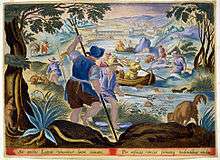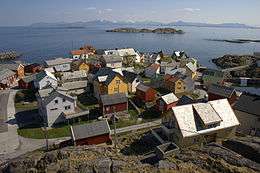2004 Morecambe Bay cockling disaster
| Location | Morecambe Bay, England |
| Cause of Death | Drowning |
| Fatalities | 23 (21 bodies recovered) |
| Survivors | 15 |
| Perpetrator | Lin Liang Ren |
The Morecambe Bay cockling disaster (Chinese: 拾貝慘案 Shi bèi cǎn'àn, "cockle-picking tragedy") occurred on the evening of 5 February 2004 at Morecambe Bay in North West England, when at least 21 Chinese illegal immigrant labourers were drowned by an incoming tide after picking cockles off the Lancashire/Cumbrian coast.[1]
Disaster
David Anthony Eden, Sr., and David Anthony Eden, Jr., a father-and-son team from England, had unlawfully hired a group of Chinese workers to pick cockles; they were to be paid £5 per 25 kg of cockles, (9p per lb), far less than the typical local rate at the time.[2] The Chinese had been imported unlawfully via containers into Liverpool, and were hired out through local criminal agents of international Chinese Triads. The cockles to be collected are best found at low tide on sand flats at Warton Sands, near Hest Bank. The Chinese workers were unfamiliar with local geography, language, and custom. They were cut off by the incoming tide in the bay around 9:30 pm.
The emergency services were alerted by a mobile phone call made by one of the workers, who spoke little English and was only able to say "sinking water" before the call was cut off.[3][4] A total of 21 bodies, of men and women between the ages of 18 and 45, were recovered from the bay after the incident. Two of the victims were women; the vast majority were young men in their 20s and 30s, with only two being over 40 and only one, a male, under 20.[5] Most of the victims were previously employed as farmers, and two were fishermen.[5] All of the bodies of the victims were found, at a variety of trajectories, at nine locations between the cockling area and shore, indicating that the majority had attempted to swim but had been overcome partly, or largely, by hypothermia.[6] Four of the victims died after the truck they used to reach the cockling area became overwhelmed by water.[7] A further two cocklers were believed to have been with those drowned, with remains of one being found in 2010.[8][9]
At the subsequent hearing, British cocklers returning to shore on the same evening were reported to have attempted to warn the Chinese group by tapping their watches and trying to speak with them.[7] A survivor testified that the leader of the group had made a mistake about the time of the tides.[2] Fourteen other members of the group are reported to have made it safely to the shore, making 15 survivors in total. The workers were all illegal immigrants, mainly from the Fujian province of China, and have been described as being untrained and inexperienced.[10]
Prosecutions
David Anthony Eden, Sr., and David Anthony Eden, Jr., from Prenton in Merseyside, who bought cockles from the work gang, were cleared of helping the workers break immigration law.[11]
Gangmaster Lin Liang Ren was found guilty of the manslaughter of at least 21 people (two further cocklers were thought to have been killed, but their bodies were never found).[12] Ren, his girlfriend Zhao Xiao Qing and his cousin Lin Mu Yong were also convicted of breaking immigration laws. Ren was sentenced to 12 years for manslaughter, 6 years for facilitating illegal immigration (to be served concurrently with the manslaughter sentence), and 2 years for conspiracy to pervert the course of justice (to be served subsequent to the manslaughter sentence).[13] Lin Mu Yong was sentenced to four years and nine months. Zhao Xiao Qing was sentenced to 2 years and 9 months for facilitation of illegal immigration and perverting the course of justice.
Media
The 2006 film Ghosts, directed by Nick Broomfield, is a dramatisation of the events leading up to the tragedy.
In 2013, artist Isaac Julien released his film Ten Thousand Waves about the disaster.[14]
The 2007 folk song "On Morecambe Bay" by folk artist Kevin Littlewood tells the story of these tragic events.[15] This song was later covered by folk musician Christy Moore.[16]
A 2005 spoken-word track by Momus, "Cockle Pickers", relates the story of the tragedy.
In 2017, British Band Stereo Honey released "The Bay" as a part of their "Monuments" EP, which is about the 2004 tragedy. [17]
See also
References
- ↑ Joe Boyle (24 March 2006). "Death in a cold, strange land". BBC. Retrieved 27 June 2014.
- 1 2 "Cockle pickers were swimming the wrong direction". Westmorland Gazette. 14 October 2005. Retrieved 2011-09-22.
- ↑ "Cockle jury played distress call". BBC News. 21 October 2005. Retrieved 22 April 2010.
- ↑ "Death in a cold, strange land". BBC News. 24 March 2006. Retrieved 16 April 2018.
- 1 2 "Ghosts — The Morecambe Victims Fund". Ghosts.uk.com. Retrieved 2011-09-22.
- ↑ "Man guilty of 21 cockling deaths". BBC News. 24 March 2006. Retrieved 22 April 2010.
- 1 2 Fickling, David (20 September 2005). "Cockler deaths jury shown film of survivor's rescue". The Guardian. London. Retrieved 22 April 2010.
- ↑ "Gangmasters 'continue to exploit'". BBC News. 31 July 2009. Retrieved 22 April 2010.
- ↑ "Skull found in Morecambe Bay 'belongs to cockle-picker'". BBC News. 18 October 2010. Archived from the original on 20 October 2010. Retrieved 19 October 2010.
- ↑ "Victims of the sands and the snakeheads". The Guardian. 7 February 2004.
- ↑ Cocklers tragedy highlights need for high safety standards Archived 20 October 2010 at the Wayback Machine. HSE press release, 24 March 2006, accessed 19 October 2010
- ↑ "Man guilty of 21 cockling deaths". BBC News. 2006-03-24.
- ↑ "Cockler gangmaster gets 14 years". BBC News. 2006-03-28.
- ↑ Simon Armstrong (25 November 2013). "From Morecambe to MoMA: New York showing for Ten Thousand Waves". BBC News. Retrieved 25 November 2013.
- ↑ "Bay tragedy is set in song".
- ↑ "On Morecambe Bay". Shiraz Socialist.
- ↑ https://genius.com/Stereo-honey-the-bay-lyrics. Missing or empty
|title=(help)

